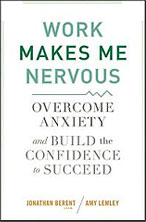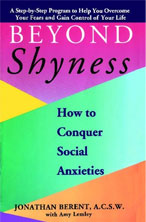Mike
– PUBLIC SPEAKING ANXIETY RESOLVED: ALCOHOL INSIGHTS
Q: Would you explain what you were experiencing when you first contacted me?
MIKE: Yeah sure, I was having, um, a real problem speaking in professional settings at work. Um, there were a few reasons for me to speak publicly outside of work. So it was really focused on my job. And, um, it was, it was, uh creating a, a real problem. I, it got to the point where I was not doing the things that I was supposed to be doing. And I felt like if I, if I let this continue that you know there could be serious problems at work. So I decided to call you.
Q: What were you not doing or avoiding?
MIKE: Well, yeah, that’s exactly what I was doing. I was avoiding. I had, part of my responsibility is to sell the services that we provide. And, uh, to do that I have to get in front of clients. And I was avoiding that. And I, you know there’s just no way I could of been successful, uh, doing my job if I, if I didn’t get out there in front of groups of people and, and you know let them know what we could do for ’em.
Q: How did you avoid those situations?
MIKE: Fortunately for me I, the, the company is small. And I’m fairly high up on the food chain and, and was able to manipulate meetings to some extent. Some I couldn’t avoid and I had to go. And, um, and, and quite frankly some of them I, you know I actually had a, a real problem performing. Uh, but I was able to, uh, s-sometimes switch personal meetings into conference calls, which helped. Things like that, uh, that helped me avoid the problem.
Q: Did you become proficient in manipulating situations to avoid the anxiety?
MIKE: That’s, yes, absolutely.
Q: How long was this going on?
MIKE: This was going on, I’ve had a problem with public speaking for, for on and off for a long time. This particular, uh, set of circumstances were going on for about, um, six, six months, eight months, something like that.
Q: Could you describe the anxiety itself?
MIKE: The, the symptoms?
Q: Yes.
MIKE: Yes, the, the most bothering symptom for me was the fact that, that when I would speak my voice would, would quiver and shake and then, um, it would, it would be really obvious that I was, that I was nervous. And, uh, I really, that really made me feel bad personally. I always, I always felt, uh, um, really disappointed in myself after an experience like that. So it was mostly the quivering of the voice. I don’t think that I had any, I was unaware of any other symptoms.
Q: How would the avoidance and anxiety impact your life?
MIKE: Well at, at, at the moment, um, I’m, I’m doing much better. At the time.
Q: At the time?
MIKE: At the time. Well at the time you know there was, it was, I was really pretty miserable. Uh, I knew that I was not doing what I was supposed to be doing at work. There was always this like gray cloud over my head that oh I, you know I’m gonna get this call. I have to go to a meeting, I have to give a presentation and it’s just gonna be bad, you know? And I’m, you know day to day worrying about that was, was, uh, you know it was just really kind of depressing.
Q: What would go on in advance of a presentation?
MIKE: Uh, yeah. It could be, um, it could be a very taxing week. What would happen typically is that you know three to four days before a, a, a speaking engagement I would probably be okay. It’s the day or two before when, when all the anxiety would start to kick in. And it would be so bad that, uh, on, on the night before a speaking engagement. I probably wouldn’t be able to get the sleep. I would be worried about it. Um, you know I, I’d be running through scenarios in my mind and I just wouldn’t be able to let it go. And I just would end up staying up all night and, and, uh, out, out of fear basically.
Q: What would you say in a percentage that you’ve accomplished?
MIKE: I would say that I’ve resolved a significant part of, of the problem. Uh, if I had to quantify I’d say something around 90 percent. I know that I still have things to work on, um, but I’m not, I don’t have the gray cloud over my head. I’m not worried about it, uh, like I used to be. I don’t stay up at night when I have a speaking engagement the next day. So, um, while I still have things to work on, I’m, you know it doesn’t, it doesn’t have the, uh, negative impact on my life that it used to.
Q: Describe how you resolved the problem?
MIKE: Yes. Basically, for me this is specific to me, uh, there were three components to my recovery. Uh, the first is understanding the problem and what I mean by that is that you know after, after ha-, discussing this with you I, I came to the realization that this is nothing more than, than what you call the physiology of performance. Just an adrenaline surge which is something that’s perfectly natural. I mean this is not a, a personal defect of mine. So coming to that realization was very helpful. That kind of took a lot of the burden off of, of my problem. Um, or associated with my problem. And the, the second component is the holistic approach to managing anxiety that, that we’ve taken, uh. And what I mean by that is, you know exposing myself to the fear which is a, which is a well known tactic. Uh, you know going to toast masters [PH] and then, uh, forcing myself in work situations to engage in, uh, speaking opportunity, however small. Um, um, and to, uh, you know start to address some of the self-esteem issues like managing my critical scripting and, and just be more accepting of myself. Um, and then you know to feed into this hol-holistic approach would be a more balanced lifestyle, um, you know you’ve helped me you know learn how to engage in more social activities, kind of achieve a work life balance that I didn’t have before.
Q: Can you explain when you had a presentation and how you dealt with the adrenaline?
MIKE: I, well that’s an interesting question. I was and I did have techniques to address that. And I think they were helpful. For, for me personally, uh, the techniques were just that. They were, they were a tactic and you know they have their purpose for, I, I think my, my biggest improvements came from the more strategic approach of, of addressing all the things that I, I just mentioned. But tactically speaking, I would, I would convince my-, I would reinforce that you know hey this is okay. This is a, this is a perfectly normal reaction. It’s not a personal defect, uh, just take it slow and easy and, uh you’ll, you’ll be okay.
Q: When you first started to work with me you believed that your problem was a character disorder.
MIKE: Yes.
Q: After the education were you on your way?
MIKE: Yes.
Q: Was it the physiology of performance?
MIKE: Yeah, that’s exactly right. And, but on my way meant you know addressing some of the other things that we talked about like exposing myself to the fear, working on my critical scripting. You know a-and another thing that, that I want to mention is that, um, I came to the realization that, that using alcohol as a crutch to manage my day to day stress and anxiety was really a, a self defeating, uh, exercise. And, and what I’m, what I’m not saying is that I would use alcohol before a public speaking engagement. I never did that. But what I did was you know drink regularly in the evening to just kind of unwind from the day and try to manage my, my stress. And that had a really negative impact on my self-esteem and I think it fed into my critical scripting and, you know not to mention what it did to my brain chemistry. Obviously alcohol’s a depressant, and when I eliminated that routine from my lifestyle it had a, a really big impact. So, a-again you know the tactics are important, and you need to have that in your toolbox but for, for me it was the, it was the, uh, overarching a-approach that included you know many of the things that I’ve just talked about. So it’s about putting the whole package together is what really worked for me.
Q: How is your life different now?
MIKE: Well it’s, it’s, um, there’s a lot less to worry about, yeah I mean it’s, it’s, I don’t, you know I don’t worry about that phone call when someone tells me I have a speaking engagement. You know and, and that used to just create such a, just like a feeling of despair that you know I mean I don’t have to live with that anymore. And it’s, it’s nice, it’s liberating. So I, I feel much better.


